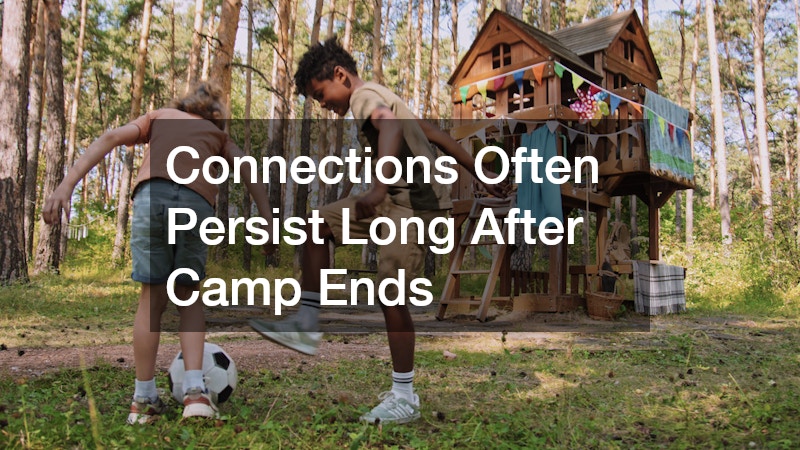Summer is often a time for relaxation, exploration, and growth, offering children unique opportunities outside the traditional classroom. Summer camps provide a structured yet flexible environment where kids can learn, play, and discover new interests. By participating in a variety of activities, children can experience personal development in ways that enrich their social, emotional, and physical lives.
Summer camps are more than just a break from school—they serve as a catalyst for learning, independence, and memorable experiences that can influence children for years to come.
Beyond offering fun experiences, summer camps create spaces where children can safely take risks, try new things, and build confidence. They allow kids to step away from familiar routines and explore unfamiliar activities, from sports and arts to science and outdoor adventures. These experiences encourage children to develop resilience, creativity, and curiosity, all while forming meaningful connections with peers and mentors. In essence, summer camps provide a holistic environment for growth that nurtures both the mind and the spirit.
Fostering Social Skills Through Group Activities
Summer camps offer children abundant opportunities to interact with peers in a structured environment, promoting teamwork, cooperation, and empathy. Participating in group activities such as team sports, collaborative games, or group challenges allows children to practice communication, negotiation, and conflict resolution skills in real time. By engaging with peers from diverse backgrounds, children learn to understand different perspectives and build positive relationships, laying a foundation for strong social development.
Activities like forming campfire teams or collaborating on arts-and-crafts projects teach children to share responsibilities and value the contributions of others. Through role-playing exercises or group problem-solving challenges, kids practice listening actively, offering constructive feedback, and finding common ground. These experiences often translate to increased confidence in social settings outside of camp, helping children navigate school and community interactions more effectively.
Encouraging Independence and Self-Confidence
Summer camps provide a safe yet challenging environment where children can develop independence and self-assurance. Away from parents or guardians, kids learn to make choices, manage daily responsibilities, and advocate for themselves, which strengthens their sense of autonomy. By overcoming small obstacles and achieving personal goals, children build a foundation for long-term self-confidence that influences both their academic and personal lives.
Setting up tents, planning group projects, and leading a small team require children to think independently and take initiative. Campers who participate in solo hikes, public performances, or skill-based challenges gain tangible proof of their abilities, boosting their self-esteem. These experiences teach children that they are capable of navigating new environments, making decisions, and succeeding through effort and persistence.
Promoting Physical Health and Outdoor Engagement
Summer camps often emphasize outdoor activities that enhance physical fitness and overall well-being. Engaging in sports, hiking, swimming, or nature-based games helps children develop strength, coordination, and cardiovascular health while encouraging an active lifestyle. Beyond physical benefits, these activities also contribute to mental wellness, reducing stress and fostering a sense of connection with nature.
Organized games like soccer tournaments, obstacle courses, and swimming lessons offer structured exercise while maintaining fun and engagement. Even nature-based experiences, such as tracking wildlife or exploring trails, promote endurance and flexibility while teaching children about environmental stewardship. Regular participation in such activities at summer camps encourages lifelong habits of fitness, outdoor exploration, and healthy living.
Stimulating Creativity and Problem-Solving
Summer camps provide an ideal environment for children to explore their creativity and develop critical thinking skills. Activities like art projects, music, theater, and science experiments stimulate imagination while encouraging innovative thinking. Problem-solving tasks, whether collaborative or individual, challenge children to analyze situations, consider alternatives, and develop solutions, enhancing cognitive flexibility.
Hands-on workshops such as building model rockets, designing costumes, or composing short plays require campers to plan, experiment, and adapt their ideas. STEM-related challenges or scavenger hunts teach logical reasoning and persistence, while arts and crafts allow for self-expression and originality. These experiences reinforce the idea that creative thinking and problem-solving are valuable skills that can be applied across academics, social situations, and everyday life.
Building Lifelong Friendships and Community
One of the most cherished benefits of summer camps is the opportunity for children to form lasting friendships and develop a sense of belonging. Camp environments encourage collaboration, mutual support, and shared experiences that foster deep interpersonal connections. By participating in group activities, children learn empathy, cooperation, and how to maintain positive relationships in diverse social settings.
Cabin life, group meals, and camp traditions like talent shows or evening storytelling sessions help children bond over shared experiences and overcome social challenges together. These connections often persist long after camp ends, creating networks of friends with shared memories and values. By experiencing the strength of community and belonging, children learn the importance of support, teamwork, and compassion, which enriches their social and emotional growth.
Summer camps are powerful tools for holistic child development, providing enriching experiences that combine education, recreation, and social growth. They nurture independence, self-confidence, and social skills while promoting physical fitness, creativity, and emotional resilience. Beyond individual benefits, summer camps cultivate a sense of community, belonging, and long-lasting friendships that contribute to a child’s overall well-being.
By offering diverse opportunities for exploration, challenge, and personal achievement, summer camps create environments where children can thrive. They equip kids with essential life skills, expand their horizons, and inspire a love for learning and discovery. In fostering these qualities, summer camps leave lasting impressions that extend far beyond a single summer, shaping children into confident, creative, and socially aware individuals ready to embrace new challenges and opportunities.

